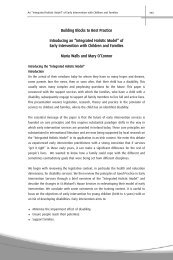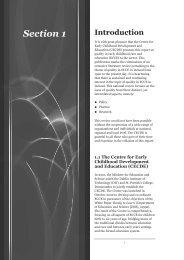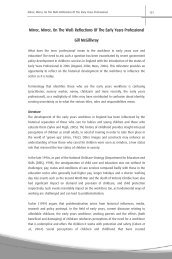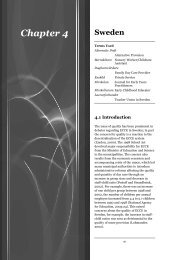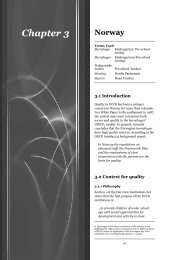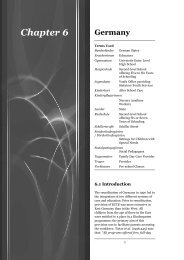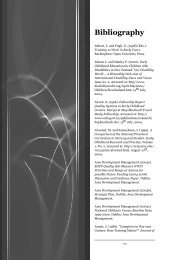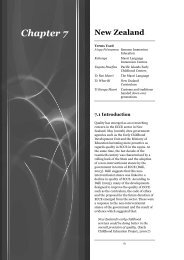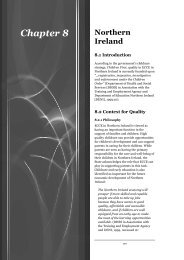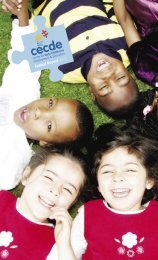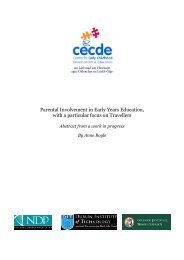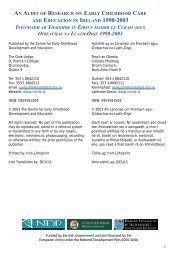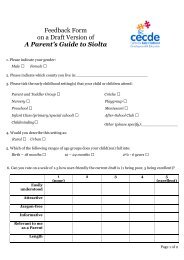Policy Developments 1990-2004 - Centre for Early Childhood ...
Policy Developments 1990-2004 - Centre for Early Childhood ...
Policy Developments 1990-2004 - Centre for Early Childhood ...
You also want an ePaper? Increase the reach of your titles
YUMPU automatically turns print PDFs into web optimized ePapers that Google loves.
Section 4<strong>Policy</strong> <strong>Developments</strong> <strong>1990</strong>-<strong>2004</strong>3. Social, Environmental and ScientificEducation (SESE)4. Arts Education5. Physical Education6. Social, Personal and HealthEducation (SPHE)Each of these areas has relevance to theinfant classes and the components andaspects of the curriculum <strong>for</strong> these classesare delineated. In support of theintroduction of the Revised Curriculum theDES distributed Your Child’s Learning– Guidelines <strong>for</strong> Parents (DES, 1999c),outlining the key features of the curriculumand ways in which parents and schoolscould collaborate regarding theimplementation of the curriculum.Draft curricular guidelines <strong>for</strong> children withspecial needs in the primary school wereissued as consultation documents in 2002(NCCA, 2002a-o), following an earlierdiscussion document, SpecialEducational Needs – CurricularNeeds (NCCA, 1999). This earlierdocument acknowledged the limitedtraining opportunities <strong>for</strong> practitionerspertaining to special needs, at both preserviceand in-service levels, and thenegative impact this has on the provision ofquality services (NCCA, 1999). Childrenwith special needs have additionalrequirements within the education systemand a high level of flexibility and continuityis required within curricular planning. Thisconsultation document was used to in<strong>for</strong>mthe production of Draft CurricularGuidelines and facilitated a wider <strong>for</strong>um <strong>for</strong>the input of stakeholders in this regard.The Draft Curricular Guidelines(NCCA, 2002 a-o) draw on the most recentnational and international best practice andresearch to support the planning andimplementation of the curriculum <strong>for</strong>students with general disabilities. Theintention is that the guidelines are to beused in conjunction with and tocomplement the mainstream curriculum.The guidelines are divided into threedistinct categories; <strong>for</strong> children with mildgeneral learning disabilities (NCCA, 2002ai),<strong>for</strong> children with moderate learningdisabilities (NCCA, 2002j-l) and <strong>for</strong>children with severe and profound generallearning disabilities (NCCA, 2002m-o).Each category contains a number ofbooklets; including Guidelines <strong>for</strong>Teachers and guidelines on an array ofcurricular areas including Mathematics,Communications and Language, ArtsEducation and SPHE. The draft guidelineswere open to comment and review and willbe revised and finalised following a periodof consultation.In addition to the above, The NationalCouncil <strong>for</strong> Curriculum and Assessment(NCCA) has recently launched Towards aFramework <strong>for</strong> <strong>Early</strong> Learning - AConsultative Document (NCCA, <strong>2004</strong>).This is an important developmentconsidering the emphasis placed on thecurriculum in achieving quality:The development of a nationalframework is an important step inhelping to provide all children withappropriately enriching, challengingand enjoyable learningopportunities from birth to sixyears. (NCCA, <strong>2004</strong>:14)This is a background paper <strong>for</strong> consultationin the process of devising a nationalframework <strong>for</strong> early years learning. TheFramework has four main aims:To support the development of allchildren 0-6 as confident and competentlearners;To emphasise the important role ofparents/guardians;To guide parents/childminders/practitioners in planning and providingappropriate learning experiences;To support existing good practices inearly learning (NCCA, <strong>2004</strong>:13).27



